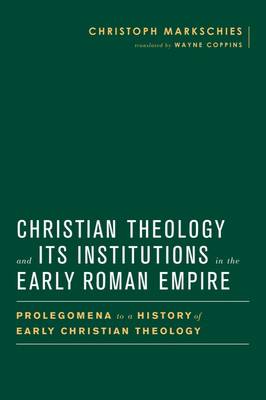
- Retrait gratuit dans votre magasin Club
- 7.000.000 titres dans notre catalogue
- Payer en toute sécurité
- Toujours un magasin près de chez vous
- Retrait gratuit dans votre magasin Club
- 7.000.0000 titres dans notre catalogue
- Payer en toute sécurité
- Toujours un magasin près de chez vous
Christian Theology and Its Institutions in the Early Roman Empire
Prolegomena to a History of Early Christian Theology
Christoph MarkschiesDescription
Tension between unity and diversity plagues any attempt to recount the development of earliest Christianity. Explanations run the gamut--from asserting the presence of a fully formed and accepted unity at the beginning of Christianity to the hypothesis that understands orthodox unity as a later imposition upon Christianity by Rome. In Christian Theology and Its Institutions in the Early Roman Empire, Christoph Markschies seeks to unravel the complex problem of unity and diversity by carefully examining the institutional settings for the development of Christian theology. Specifically, Markschies contends that theological diversity is closely bound up with institutional diversity.
Markschies clears the ground by tracing how previous studies fail to appreciate the critical role that diverse Christian institutions played in creating and establishing the very theological ideas that later came to define them. He next examines three distinct forms of institutional life--the Christian institutions of (higher) learning, prophecy, and worship--and their respective contributions to Christianity's development. Markschies then focuses his attention on the development of the New Testament canon, demonstrating how different institutions developed their own respective "canons," while challenging views that assign a decisive role to Athanasius, Marcion, or the Gnostics. Markschies concludes by arguing that the complementary model of the "identity" and "plurality" of early Christianity is better equipped to address the question of unity and diversity than Walter Bauer's cultural Protestant model of "orthodoxy and heresy" or the Jesuit model of the "inculturation" of Christianity.
Spécifications
Parties prenantes
- Auteur(s) :
- Editeur:
Contenu
- Nombre de pages :
- 520
- Langue:
- Anglais
- Collection :
Caractéristiques
- EAN:
- 9781481304016
- Date de parution :
- 15-09-15
- Format:
- Livre relié
- Format numérique:
- Genaaid
- Dimensions :
- 147 mm x 231 mm
- Poids :
- 839 g

Les avis
Nous publions uniquement les avis qui respectent les conditions requises. Consultez nos conditions pour les avis.






